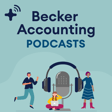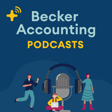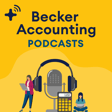
Cool Careers in Accounting Ep. 20 - Innovating the Future of Public Accounting with Chris Vanover
Chris Vanover joins host Mike Potenza to share his fascinating career journey from working at PwC and the PCAOB to founding CPAClub. A two-time Accounting Today Top 100 Most Influential People in Accounting honoree, Vanover discusses his innovative approach to public accounting, emphasizing a subscription-based model, work-life balance, and employee satisfaction. He also highlights his passion for reimagining the profession, leadership philosophy, and efforts to address the talent pipeline issue. Join us for this valuable conversation offering insights into the future of accounting and the importance of adaptability and innovation in the field.
Earn CPE by listening to this podcast through a Becker Prime CPE subscription.
Listen to this episode through your Becker LMS platform to complete practice questions, pass the final exam, and earn CPE credit.
Already a Becker Prime CPE customer? Login here.
Have access to Becker CPE through your employer? Earn CPE credit for this podcast however you consume Becker CPE, either through your company’s LMS or via the Becker platform. Not sure where to log in? Check with your CPE admin.
Learn more about CPE Podcasts from Becker: https://www.becker.com/cpe/becker-podcasts


